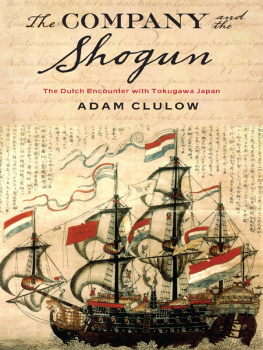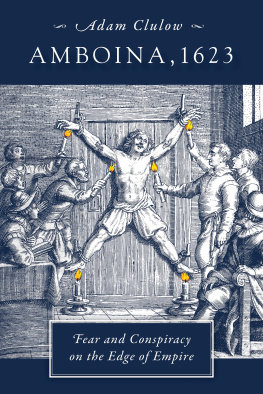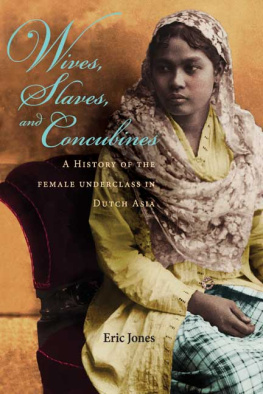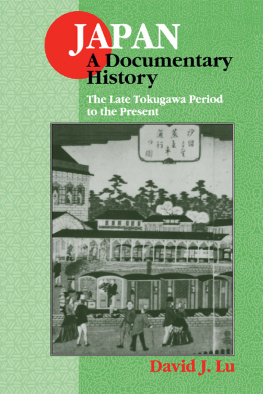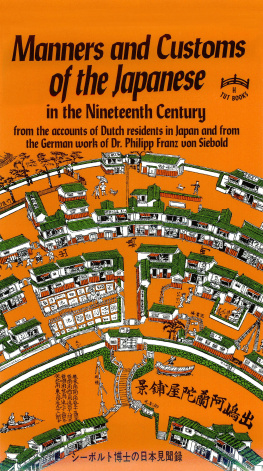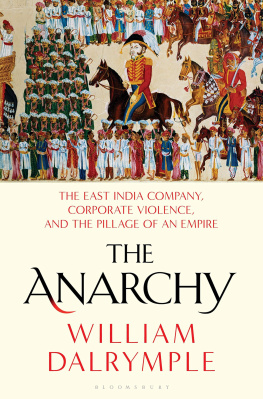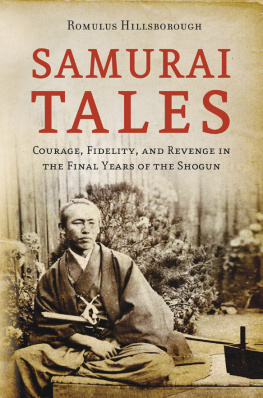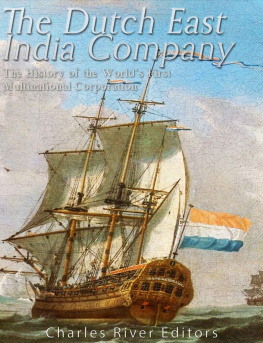The Company and the Shogun
COLUMBIA STUDIES IN INTERNATIONAL AND GLOBAL HISTORY
Matthew Connelly and Adam McKeown, Series Editors
The idea of globalization has become a commonplace, but we lack good histories that can explain the transnational and global processes that have shaped the contemporary world. Columbia Studies in International and Global History will encourage serious scholarship on international and global history with an eye to explaining the origins of the contemporary era. Grounded in empirical research, the titles in the series will also transcend the usual area boundaries and will address questions of how history can help us understand contemporary problems, including poverty, inequality, power, political violence, and accountability beyond the nation-state.
Cemil Aydin, The Politics of Anti-Westernism in Asia: Visions of World Order in Pan-Islamic and Pan-Asian Thought
Adam M. McKeown, Melancholy Order: Asian Migration and the Globalization of Borders
Patrick Manning, The African Diaspora: A History Through Culture
James Rodger Fleming, Fixing the Sky: The Checkered History of Weather and Climate Control
Steven Bryan, The Gold Standard at the Turn of the Twentieth Century: Rising Powers, Global Money, and the Age of Empire
Heonik Kwon, The Other Cold War
Samuel Moyn and Andrew Sartori, eds., Global Intellectual History
The Company and the Shogun
THE DUTCH ENCOUNTER WITH TOKUGAWA JAPAN
Adam Clulow
Columbia University Press
New York
Columbia University Press
Publishers Since 1893
New York Chichester, West Sussex
cup.columbia.edu
Copyright 2014 Columbia University Press
All rights reserved
E-ISBN 978-0-231-53573-1
Library of Congress Cataloging-in-Publication Data Clulow, Adam.
The company and the shogun: The Dutch encounter with Tokugawa Japan / Adam Clulow.
pages cm. (Columbia studies in international and global history)
Includes bibliographical references and index.
ISBN 978-0-231-16428-3 (cloth: alk. paper)
ISBN 978-0-231-53573-1 (e-book)
1. Nederlandsche Oost-Indische CompagnieHistory. 2. JapanCommerceNetherlandsHistory. 3. NetherlandsCommerceJapanHistory. 4. JapanHistoryTokugawa period, 16001868. I. Title.
HF483.E6C58 2014
382.09492052dc23
2013019450
A Columbia University Press E-book.
CUP would be pleased to hear about your reading experience with this e-book at .
Jacket design by Julia Kishnirsky Jacket artwork: Merchant Ship of the Dutch East India Company, 1782. Nagasaki School, published by Toshimaya Hand coloured woodblock print. 65 x 58 cm. Courtesy of Bonhams Picture Library
References to websites (URLs) were accurate at the time of writing. Neither the author nor Columbia University Press is responsible for URLs that may have expired or changed since the manuscript was prepared.
CONTENTS
In a decade since I first began work on this project, I have accumulated a number of scholarly and personal debts that I can never hope to repay. My career as a Japanese historian began, quite unexpectedly, when after completing my first degree in South Africa, I was awarded a Monbukagakush scholarship to study in Japan. As the program had only just extended to South Africa, which had as yet no Japanese language programs, I traveled to Niigata University, my designated host institution, knowing no Japanese and without the slightest background in East Asian history. For these reasons, I am enormously grateful to all my teachers at Niigata University who enabled me first to find my footing and later to complete my masters degree. My thanks go especially to Yoshii Kenichi, who agreed to take on such a plainly underqualified student, and to Igor Saveliev, who was a constant source of support and encouragement, but also to Imura Tetsuo, It Rei, the inimitable Nakamura-sensei, Furamaya Tadao, and many others that I cannot name here.
This project first took tentative form during my doctoral studies at Columbia University, where I owe special thanks to my adviser, David Lurie, who took on a project very distant from his own work, but proved in every way the ideal academic mentor and who remains to this day my model for how to treat students. Carol Gluck, whose intellectual energy and organizational drive has been so central to the success of Columbias Japanese history program, was equally supportive and I benefited as well from numerous discussions with Henry Smith, Greg Pflugfelder, and other Columbia faculty. Bob McCaughey sparked my interest in maritime history and, to my great benefit, drew first my research and later my teaching slowly out to sea. Lauren Benton, who generously agreed to serve on my dissertation committee, challenged me to think in new ways about legal history and her work and insights have shaped my research. I shared my time first at Columbia and later in Japan, with a group of scholars and friends who made the long hours of research and training an unexpected pleasure. Although I cannot name them all, I am especially grateful to Colin Jaundrill, Chelsea Foxwell, Reto Hofmann, Federico Marcon, Mathew Thompson, Ariel Fox, Steve Wills, Dennis Frost, Joy Kim, and Chad Diehl for their friendship and company.
Much of the research for this project was conducted at the Historiographical Institute at the University of Tokyo, to which I have returned on regular occasions. The field of Japanese-Dutch relations (nichiran kankei) relies on the tireless work of Matsui Yko, Matsukata Fuyuko, and the staff of the Overseas Material Sections, who have taken on the onerous task of editing the diaries of the Dutch opperhoofden in Japan, and my research would not have been possible without everything they have done. They have also made each of my stays at the institute a pleasure and have generously made time to offer advice on a host of issues. It was my great privilege to work closely with Professor Matsukata on the translation of part of her pioneering monograph, and I learned more from this than I can say. At Tokyo University, Oka Mihoko, Yukitake Kazuhiro, Kat Eiichi, Haneda Masashi, Gonoi Takashi, Yamamoto Hirofumi, and the staff of the institutes library all helped me in a range of different ways while Ohashi Akiko, as she has done for so many visiting fellows, turned our shared office into far more than just a space for research. Nagazumi Yko, the great historian of the Dutch in Japan, graciously agreed to meet with me and offered a range of insights into my work. I am also grateful to Igawa Kenji, who has helped me navigate the difficult terrain of seventeenth-century sources, and to Got Atsushi for his tireless assistance in fielding a seemingly endless sequence of translation-related queries.
My research was made possible by a Japan Foundation doctoral fellowship, which enabled me to spend a year in Japan. After I returned to the United States, the American Council of Learned Societies provided me with crucial writing time via a dissertation completion fellowship and subsequently an early career fellowship. A second fellowship from the Japan Foundation enabled me to return to Japan for three months in late 2009 to collect the last remaining sources for this project.
Over the years, I have made numerous visits to the Netherlands, where I received guidance and support from Cynthia Viall, Willem Boot, Atsushi Ota, Femme Gaastra, and others. Special mention must be made of Leonard Bluss, the towering figure in my field, whose intellectual contribution and unrivaled production of source materials has transformed the way all of us do research. In all of our meetings, whether in Japan, the Netherlands, or the United States, he has pushed me to rethink my ideas while always inspiring me to go back to the archives with renewed enthusiasm. Although I was never part of the TANAP program, I have benefitted greatly from its reinvigoration of the field and from the steady stream of excellent monographs that it has produced. In the Netherlands my particular thanks must go to Nadia Kreeft, who visited the National Archives in The Hague numerous times on my behalf to scan and copy long lists of materials for this project, while also offering invaluable aid whenever I became stuck with a translation.

